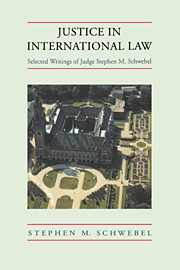Book contents
- Frontmatter
- Contents
- Preface
- PART I International Court of Justice
- PART II International Arbitration
- PART III United Nations
- 15 The Origins and Development of Article 99 of the Charter
- 16 The International Character of the Secretariat of the United Nations
- 17 Secretary-General and Secretariat
- 18 A United Nations “Guard” and a United Nations “Legion”
- 19 Mini-States and a More Effective United Nations
- 20 Article 19 of the Charter of the United Nations: Memorandum of Law
- 21 The United States Assaults the ILO
- 22 Goldberg Variations
- PART IV International Contracts and Expropriation
- PART V Aggression under, Compliance with, and Development of International Law
- List of publications
- Index
16 - The International Character of the Secretariat of the United Nations
Published online by Cambridge University Press: 06 November 2009
- Frontmatter
- Contents
- Preface
- PART I International Court of Justice
- PART II International Arbitration
- PART III United Nations
- 15 The Origins and Development of Article 99 of the Charter
- 16 The International Character of the Secretariat of the United Nations
- 17 Secretary-General and Secretariat
- 18 A United Nations “Guard” and a United Nations “Legion”
- 19 Mini-States and a More Effective United Nations
- 20 Article 19 of the Charter of the United Nations: Memorandum of Law
- 21 The United States Assaults the ILO
- 22 Goldberg Variations
- PART IV International Contracts and Expropriation
- PART V Aggression under, Compliance with, and Development of International Law
- List of publications
- Index
Summary
the league of nations and the charter of the united nations
The Secretariat of the United Nations was established as a body exclusively international in its responsibilities as a matter of course. Article 100 of the Charter is couched in emphatic language admitting of no qualification:
In the performance of their duties the Secretary-General and the staff shall not seek or receive instructions from any government or from any other authority external to the Organization. They shall refrain from any action which might reflect on their position as international officials responsible only to the Organization.
Each Member of the United Nations undertakes to respect the exclusively international character of the responsibilities of the Secretary-General and the staff and not to seek to influence them in the discharge of their responsibilities.
The concept of a Secretariat which, as the Charter prescribes, shall be of “exclusively international character” is relatively new. The authors of the Covenant of the League of Nations did not specify that the League Secretariat was to consist of anything more than a permanent grouping of national contingents. It was Sir Eric Drummond, the first Secretary-General, who made the epochal decision that the League Secretariat should be genuinely international. However, the part of the Secretariat in the United Nations as the expression of an international outlook surpasses in significance the part which it played in the League. For the Secretary-General of the United Nations is endowed with political powers which were withheld from his League predecessors.
The League Experience
The experiment of the League of Nations in international administration was, on the whole, notably successful.
- Type
- Chapter
- Information
- Justice in International LawSelected Writings, pp. 248 - 296Publisher: Cambridge University PressPrint publication year: 1994



